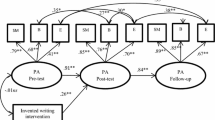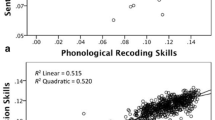Abstract
The goal of the present intervention research was to test whether guided invented spelling would facilitate entry into reading for at-risk kindergarten children. The 56 participating children had poor phoneme awareness, and as such, were at risk of having difficulty acquiring reading skills. Children were randomly assigned to one of three training conditions: invented spelling, phoneme segmentation, or storybook reading. All children participated in 16 small group sessions over 8 weeks. In addition, children in the three training conditions received letter-knowledge training and worked on the same 40 stimulus words that were created from an array of 14 letters. The findings were clear: on pretest, there were no differences between the three conditions on measures of early literacy and vocabulary, but, after training, invented spelling children learned to read more words than did the other children. As expected, the phoneme-segmentation and invented-spelling children were better on phoneme awareness than were the storybook-reading children. Most interesting, however, both the invented spelling and the phoneme-segmentation children performed similarly on phoneme awareness suggesting that the differential effect on learning to read was not due to phoneme awareness per se. As such, the findings support the view that invented spelling is an exploratory process that involves the integration of phoneme and orthographic representations. With guidance and developmentally appropriate feedback, invented spelling provides a milieu for children to explore the relation between oral language and written symbols that can facilitate their entry in reading.
Similar content being viewed by others
References
Ball, E. W., & Bachman, B. A. (1991). Does phoneme awareness training in kindergarten make a difference in early word recognition and developmental spelling. Reading Research Quarterly, 26, 49–66.
Bus, A. G., & van IJzendoorn, M. H. (1999). Phonological awareness and early reading: A meta-analysis of experimental training studies. Journal of Educational Psychology, 91, 403–414.
Caravolas, M., Hulme, C., & Snowling, M. J. (2001). The foundations of spelling ability: Evidence from a 3-year longitudinal study. Journal of Memory and Language, 45, 751–774.
Caravolas, M., Volín, J., & Hulme, C. (2005). Phoneme awareness is a key component of alphabetic literacy skills in consistent and inconsistent orthographies: Evidence from Czech and English children. Journal Experimental Child Psychology, 92, 107–139.
Clarke, L. K. (1988). Invented versus traditional spelling in first graders’ writings: Effects on learning to spell and read. Research in the Teaching of English, 22, 281–309.
Dunn, L. M., & Dunn, L. M. (1997). The peabody picture vocabulary test (3rd ed.). Minneapolis, MN: Pearson Assessments.
Ehri, L. (1989). Development of spelling knowledge and its role in reading acquisition and reading disabilities. Journal of Learning Disabilities, 22, 356–365.
Ehri, L. (2005). Learning to read words: Theory, findings, and issues. Scientific Studies of Reading, 9, 167–188.
Ehri, L. C., Nunes, S. R., Willows, D. M., Schuster, B. V., Yaghoub-Zadeh, Z., & Shanahan, T. (2001). Phoneme awareness instruction helps children learn to read: Evidence from the National Reading Panel’s meta-analysis. Reading Research Quarterly, 36, 250–287.
Ehri, L. C., & Wilce, L. S. (1987). Does learning to spell help beginners learn to read words? Reading Research Quarterly, 20, 47–65.
Elkonin, D. B. (1973). U.S.S.R. In I. Downing (Ed.), Comparative reading: Cross national studies of behavior and processes in reading and writing (pp. 551–580). New York, NY: MacMillan.
Ferreiro, E., & Teberosky, A. (1982). Literacy before schooling. Exter, NH: Heineman education Press.
Frith, U. (1985). Beneath the surface of developmental dyslexia. In K. Patterson, M. Coltheart, & J. Marshall (Eds.), Surface dyslexia, neuropsychological and cognitive studies of phonological reading (pp. 301–330). London, GB: Lawrence Erlbaum.
Gentry, J. R., & Gillet, J. W. (1993). Teaching kids to spell. Portsmouth, NH: Heinemann.
Henderson, E. H. (1981). Learning to read and spell: A child’s knowledge of words. DeKalb, IL: N. Illinois University Press.
Hohn, W., & Ehri, L. (1983). Do alphabet letters help prereaders acquire phoneme segmentation skill? Journal of Educational Psychology, 75, 752–762.
Juel, C. (1988). Learning to read and write: A longitudinal study of 54 children from first through fourth grades. Journal of Educational Psychology, 80, 443–447.
Lever, R., & Sénéchal, M. (2011). Discussing stories: How a dialogic reading intervention improves kindergarteners’ oral narrative construction. Journal of Experimental Child Psychology, 108, 1–24.
Lonigan, C. J., Burgess, S. R., & Anthony, J. L. (2000). Development of emergent literacy and early reading skills in preschool children: Evidence from a latent-variable longitudinal study. Developmental Psychology, 36, 596–613.
Martins, M. A., & Silva, C. (2006). The impact of invented spelling on phoneme awareness. Learning-and-Instruction, 16, 41–56.
McBride-Chang, C. (1998). The development of invented spelling. Early Education and Development, 9, 147–160.
Morris, D., & Perney, J. (1984). Developmental spelling as a predictor of first grade reading achievement. The Elementary School Journal, 84, 440–457.
Ouellette, G., & Sénéchal, M. (2008a). Pathways to literacy: A study of invented spelling and its role in learning to read. Child Development, 79, 899–913.
Ouellette, G., & Sénéchal, M. (2008b). A window into early literacy: Exploring the cognitive and linguistic underpinnings of invented spelling. Scientific Studies of Reading, 12, 1–25.
Perfetti, C. A., & Hart, L. (2002). The lexical quality hypothesis. In L. Verhoeven, C. Elbro, & P. Reitsma (Eds.), Precursors of functional literacy (pp. 189–213). Philadelphia, PA: John Benjamins.
Read, C. (1971). Pre-school children’s knowledge of English phonology. Harvard Educational Review, 41, 1–34.
Richgels, D. J. (1995). Invented spelling ability and printed word learning in kindergarten. Reading Research Quarterly, 30, 96–109.
Rieben, L., Ntamakiliro, L., Gonthier, B., & Fayol, M. (2005). Effects of various early writing practices on reading and spelling. Scientific Studies of Reading, 9, 145–166.
Scarborough, H. S. (1998). Early identification of children at risk for reading disabilities: Phonological awareness and some promising predictors. In B. K. Shapiro, P. J. Pasquale, & A. J. Capute (Eds.), Specific reading disability: A view of the spectrum (pp. 75–119). Timonium, MD: York Press.
Schulz, K. F., Altman, D. G., & Moher, D. (2010). CONSORT 2010 Statement: updated guidelines for reporting parallel group randomised trials. Annals of Internal Medicine, 152, 1–8.
Sénéchal, M. (2006). Testing the home literacy model: Parent involvement in kindergarten is differentially related to grade 4 reading comprehension, fluency, spelling, and reading for pleasure. Journal for the Scientific Study of Reading, 10, 59–87.
Share, D. L. (1995). Phonological coding and self-teaching: Sine-qua-non of reading acquisition. Cognition, 55, 151–218.
Shatil, E., Share, D. L., & Levin, I. (2000). On the contribution of kindergarten writing to grade 1 literacy: A longitudinal study in Hebrew. Applied Psycholinguistics, 21, 1–21.
Silva, C., & Martins, M. A. (2003). Relations between children’s invented spelling and the development of phonological awareness. Educational Psychology, 23, 3–16.
Sirois, P., Boisclair, A., & Giasson, J. (2008). Understanding of the alphabetic principle through invented spelling among hearing-impaired children learning to read and write: Experimentation with a pedagogical approach. Journal of Research in Reading, 31, 339–358.
Tangel, D. M., & Blachman, B. A. (1992). Effect of phoneme awareness instruction on kindergarten children’s invented spelling. Journal of Reading Behavior, 24, 233–261.
Treiman, R. (1993). Beginning to spell. New York, NY: Oxford University Press.
Vellutino, F. R., Fletcher, J. M., Snowling, M. J., & Scanlon, D. M. (2004). Specific reading disability (dyslexia): What have we learned in the past four decades? Journal of Child Psychology and Psychiatry, 45, 2–40.
Wagner, R. K., Torgesen, J. K., & Rashotte, C. A. (1999). Comprehensive test of phonological processing. Austin, TX: Pro-Ed.
Weschler, D. (1989). Weschler preschool and primary scale of intelligence—revised. San Antonio, TX: The Psychological Corporation.
Woodcock, R. W. (1998). Woodcock reading mastery tests—revised. Circle Pines, MN: American Guidance Service.
Author information
Authors and Affiliations
Corresponding author
Appendix: Stimuli
Appendix: Stimuli
Letters taught in the interventions
A, B, D, E, I, L, N, O, P, R, S, T, U, Y.
Words used in the interventions
Sessions 1 and 2 | ape | eel | on | in | no |
Sessions 3 and 4 | day | see | pie | add | toe |
Sessions 5 and 6 | rod | lap | pen | bib | sun |
Sessions 7 and 8 | sad | rip | nut | rat | net |
Sessions 9 and 10 | soap | nail | line | pole | seal |
Sessions 11 and 12 | rain | toad | date | rope | bite |
Sessions 13 and 14 | lady | ladder | apple | puppy | panda |
Sessions 15 and 16 | nest | spider | star | bird | snail |
Rights and permissions
About this article
Cite this article
Sénéchal, M., Ouellette, G., Pagan, S. et al. The role of invented spelling on learning to read in low-phoneme awareness kindergartners: a randomized-control-trial study. Read Writ 25, 917–934 (2012). https://doi.org/10.1007/s11145-011-9310-2
Published:
Issue Date:
DOI: https://doi.org/10.1007/s11145-011-9310-2




